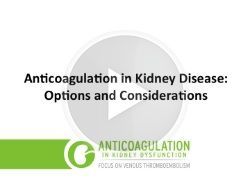Publié dans General Nephrology.
Anticoagulation in Kidney Disease: Options and Considerations
-
Learning Objectives
- Identify venous thromboembolism (VTE) risk in the general population and in patients with kidney dysfunction
- Differentiate the pharmacological and pharmacokinetic differences between unfractionated heparin, low molecular heparins, and oral anticoagulants
- Review best practices guidelines and clinical evidence in VTE prevention
- Discuss treatment strategies for patients diagnosed with VTE that balance both thrombosis and bleeding risk
Speaker
 Christine Ribic MD, FRCPC, MSc Biography Dr. Christine Ribic is a transplant nephrologist and an assistant professor at McMaster University. She obtained her MD from the University of Toronto and completed her Internal Medicine and Nephrology residency at McMaster University. She completed a Master of Science in Pharmacology at the University of Toronto in 2001 and is completing a Master of Science in Clinical Epidemiology and Biostatistics in the Health Research Methodology Program at McMaster University. Dr. Ribic’s research interests are in the area of renal transplantation and end stage renal disease with a focus on disease prevention and health outcomes utilizing both clinical studies as well as databases. She is currently the principal investigator on a prospective, observational cohort studies examining venous thromboembolism in recipients of renal transplants; a randomized control trial examining extracorporeal anticoagulation in dialysis and several other research projects in transplant recipients and patients with end stage renal disease. She holds several research grants including the McMaster Internal Career Award in Research.
Christine Ribic MD, FRCPC, MSc Biography Dr. Christine Ribic is a transplant nephrologist and an assistant professor at McMaster University. She obtained her MD from the University of Toronto and completed her Internal Medicine and Nephrology residency at McMaster University. She completed a Master of Science in Pharmacology at the University of Toronto in 2001 and is completing a Master of Science in Clinical Epidemiology and Biostatistics in the Health Research Methodology Program at McMaster University. Dr. Ribic’s research interests are in the area of renal transplantation and end stage renal disease with a focus on disease prevention and health outcomes utilizing both clinical studies as well as databases. She is currently the principal investigator on a prospective, observational cohort studies examining venous thromboembolism in recipients of renal transplants; a randomized control trial examining extracorporeal anticoagulation in dialysis and several other research projects in transplant recipients and patients with end stage renal disease. She holds several research grants including the McMaster Internal Career Award in Research.
-
 Christine Ribic MD, FRCPC, MSc Biography Dr. Christine Ribic is a transplant nephrologist and an assistant professor at McMaster University. She obtained her MD from the University of Toronto and completed her Internal Medicine and Nephrology residency at McMaster University. She completed a Master of Science in Pharmacology at the University of Toronto in 2001 and is completing a Master of Science in Clinical Epidemiology and Biostatistics in the Health Research Methodology Program at McMaster University. Dr. Ribic’s research interests are in the area of renal transplantation and end stage renal disease with a focus on disease prevention and health outcomes utilizing both clinical studies as well as databases. She is currently the principal investigator on a prospective, observational cohort studies examining venous thromboembolism in recipients of renal transplants; a randomized control trial examining extracorporeal anticoagulation in dialysis and several other research projects in transplant recipients and patients with end stage renal disease. She holds several research grants including the McMaster Internal Career Award in Research.
Christine Ribic MD, FRCPC, MSc Biography Dr. Christine Ribic is a transplant nephrologist and an assistant professor at McMaster University. She obtained her MD from the University of Toronto and completed her Internal Medicine and Nephrology residency at McMaster University. She completed a Master of Science in Pharmacology at the University of Toronto in 2001 and is completing a Master of Science in Clinical Epidemiology and Biostatistics in the Health Research Methodology Program at McMaster University. Dr. Ribic’s research interests are in the area of renal transplantation and end stage renal disease with a focus on disease prevention and health outcomes utilizing both clinical studies as well as databases. She is currently the principal investigator on a prospective, observational cohort studies examining venous thromboembolism in recipients of renal transplants; a randomized control trial examining extracorporeal anticoagulation in dialysis and several other research projects in transplant recipients and patients with end stage renal disease. She holds several research grants including the McMaster Internal Career Award in Research.
